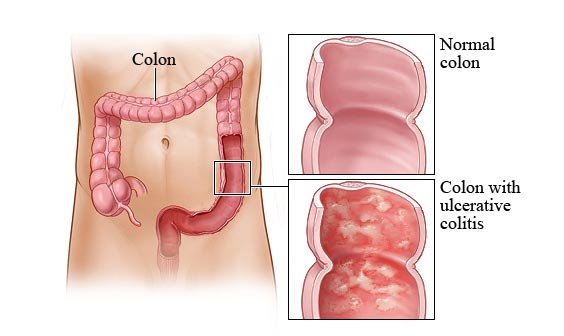Symptoms of Ulcerative Colitis
Ulcerative colitis symptoms can vary, depending on the severity of inflammation and where it occurs. Most people with ulcerative colitis have mild to moderate symptoms. The course of ulcerative colitis may vary, with some people having long periods of remission.
- Diarrhea, often with blood or pus
- Abdominal or Rectal pain and cramping
- Rectal bleeding — passing small amount of blood with stool
- Urgency to defecate
- Inability to defecate despite urgency
- Weight loss and Fatigue
- Fever
- In children, failure to grow
Major Causes
Ulcerative colitis happens when your body’s immune system does not work properly. It causes inflammation in the inner lining of your colon. The irritation and swelling in turn lead to ulcers and open sores in the lining. The cause of ulcerative colitis is unknown.
Diagnosis of Ulcerative Colitis
The following tests and procedures may be performed for diagnosing Ulcerative Colitis-
- Blood tests & Stool sample analysis
- Barium Enema
- Flexible Sigmoidoscopy
- Biopsy
- Colonoscopy
Treatment for Ulcerative Colitis available at Santhosh Hospital
Treatment for Ulcerative Colitis usually involves either drug therapy or surgery. Several categories of drugs may be effective in treating ulcerative colitis depending on the severity of your condition. The drugs that work well for some people may not work for others, so it may take time to find a medication that helps you. In addition, because some drugs have serious side effects, you'll need to weigh the benefits and risks of any treatment.
Sometimes surgery may be performed to remove part or all of the colon if medication isn't working, or symptoms get worse, or when ulcerative colitis leads to serious complications.



